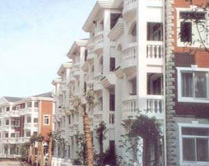 As further proof the government is trying to cool down the country's overheated real estate market, China's Ministry of Land and Resources announced a freeze on the leasing of land for development of new villas in an emergency notice issued yesterday.
As further proof the government is trying to cool down the country's overheated real estate market, China's Ministry of Land and Resources announced a freeze on the leasing of land for development of new villas in an emergency notice issued yesterday.
"Some developers have set aside areas covering thousands of square meters for a single villa -- that's too much," ministry spokesman Yue Xiaowu told Shanghai Daily yesterday.
One of the projects that Yue was referring to is a villa project in Shanghai's Sheshan area, where a single 13,300-square-meter villa sold for 130 million yuan (US$15.6 million).
"The government doesn't encourage development of luxury housing that is far above the average living standard," Yue said.
Developers in Shanghai put 59 new villa projects on the market last year, accounting for 12 percent of all residential projects put on sale in 2002, an increase of 18.6 percent from 2001. Seventy-one percent of villas in the city sold for between 500,000 yuan (US$60,477.8) and 1.2 million yuan (US$145,147) -- far more than what the average local resident can afford.
Yesterday's freeze is expected to benefit current villa owners and developers that already own land zoned for villa development, according to Pan Zhenrong, sales manager for Shanghai Bestland Co. Ltd, the developer of Sunville Villas in Sheshan.
"As the supply will decrease, prices are expected to rise," he said.
The ministry's notice said the government should zone less land for luxury housing projects in order to build more apartments for average homebuyers. The government already assists developers in building low-cost housing by offering them cheap land.
The notice also said industry watchdogs around the country must do a better job of ensuring land zoned for agricultural use isn't utilized to build industrial zones.
"Industrial parks and special economic zones do help city governments attract overseas investment," said Yue. "But some of them misuse land reserved for agriculture."
The moves are seen by industry experts as an attempt to cool China's booming real estate market.
Wang Xiaoguang, a senior researcher with the State Development Planning Commission, said that China's real estate market has shown feverish signs and needs to calm down gradually.
Last year, real estate investment grew 28.2 percent year-on-year, while it is only expected to grow 15 percent this year, according to a commission report released yesterday.
High-flying housing prices are expected to pull back in the coming two or three years, said the report.
Some cities have already seen the bubble burst.
Following three consecutive years of growth, average housing prices in Beijing dropped 1 percent in the last quarter of 2002 to 4,179 yuan (US$505.47) per square meter.
Shanghai's housing market, however, will remain strong this year, said Cai Yutian, director of the Shanghai Land and Housing Administrative Bureau.
(eastday.com February 20, 2003)
|

